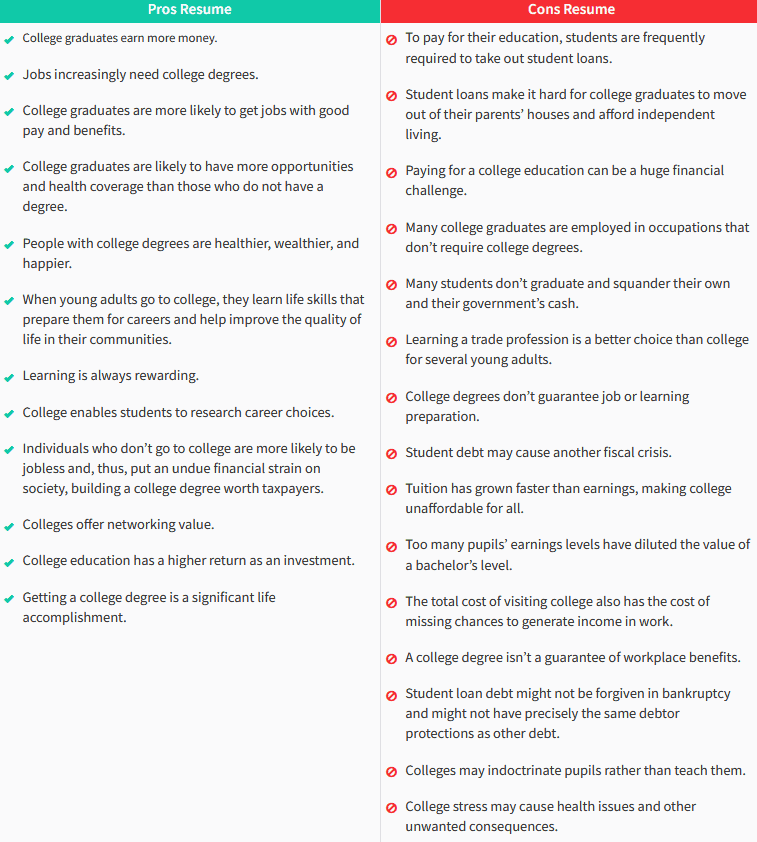More and more people in the United States want young people to go to college. Teachers, counselors, and other adults who want to help you have probably told you that you need to go to college to make a good living.
Getting a college degree is a big deal in the U.S. today.
Should You Really Go to College?
In today’s world of better technology and communication, many jobs require training or education beyond high school. College can be costly. For example, tuition, fees, and books for a four-year degree can add up to $75,000. Moreover, graduates often have to pay back loans for many years.
You should think carefully about whether your goals are worth the time, work, and money it takes to get a four-year degree. If you are smart and want to do it, college can be a great way to learn more and get a degree.

How much does going to college cost? A Lot… But it’s completely worth it.
If you’re thinking about going to college soon, be ready to spend a lot of money.
Because college can be so expensive, you should do as much research as you can to make sure you choose the right level.
The College Board says that out-of-state students spend an average of $26,820 per year to go to a public college. On the other hand, private schools cost an average of $54,880 per year to attend.
This means that the total cost of a college education ranges from $107,280 to $219,520.

College’s pros and cons
The most recent numbers show that about 20 million college students and 44 million Americans have a total student loan debt of $1.5 trillion.
There are different ideas about whether a college degree is worth it.
-
Some people say that college is worth it because college graduates are more likely to get jobs, make more money, and have more benefits at work than high school graduates. They say that people who go to college have better social skills, live longer, have healthy kids, and have shown that they can achieve big goals.
-
People who don’t think college is worth it say that college loans are too expensive and keep people from saving for retirement, buying a house, or getting married. Many successful people have never been to college, and many jobs, like plumbers, carpenters, electricians, and crane operators, do not require a degree.
Whether you go to college depends on your future goals, who you are, your willingness to take on student loan debt, and what you are ready to sacrifice.
Why attending college may be the best money you ever spent
College is worth the money for numerous people. Not only does college give you valuable life experience and help you make friends for life, but it also has the following benefits:
College graduates make more money than people who didn’t go to college.
Even though the cost of post-secondary education is going up, most college graduates can still pay for their degrees. People who have a bachelor’s degree usually make more than those who only have a high school diploma.
How much is that? The average wage for someone with a high school diploma is $38,792. Northeastern University looked at data from the Bureau of Labor Statistics and found that their average unemployment rate in 2019 was 3.7%. In contrast, the median salary for people with a bachelor’s degree is $64,896, and their average unemployment rate is 2.2%.
People who finish college can make hundreds of thousands of dollars more in their jobs than people who don’t go to college.
A college degree is needed for almost all jobs.
In the past, it wasn’t necessary to go to college to make a middle-class income. But, sadly, that’s no longer the case.
Without a college degree on your resume, it might be harder to find a hard job, and the competition for those jobs will be fierce.
Health insurance is more likely to be owned by people with a college degree.
With the cost of health care going up and up, it is important for your health to have good health insurance. But it can be too expensive to buy health insurance at home.
You might not understand it, but there is a strong link between going to college and how health care is handled.
A lot more college graduates from than high school graduates have coverage through their jobs, which helps pay for their health care costs. The College Board found that 64 percent of employees with bachelor’s degrees and 70 percent of employees with advanced degrees had an employer-provided policy. Company plans, on the other hand, only covered 52% of high school graduates.
You can find out more about your favorite
College opens you up to a whole new world. In high school, you usually only have a few electives to choose from. In college, however, you can select from hundreds of lessons and college classes.
Even though most colleges have core requirements, you can decide what you want to study and take classes in areas you want to learn more about. Because of this, many students can get excited about learning in college.
Many people have friends and former students who were inspired by college courses that changed their professional and academic lives for the better.
You’ll also have many extracurricular activities and chances to try things you might not have done otherwise. These things can become lifelong passions, help you make important connections, and get you ready for work in the future.
You could write for your college’s newspaper or become a DJ at the radio station. It is possible to help people in need to build homes. You can help with political campaigns or join groups that work on different social issues. You can pick either one.
You will have fun and make friends.
Almost everyone I know who went to college really enjoyed their time there. We often forget how essential fun is when it comes to school, but some of my best memories and most fun times are from college. You can go to parties, plays, sports games, concerts, and other events. You can also have random fun with your coworkers.
Most schools also have interesting speakers and events on campus. For example, colleges frequently have well-known musicians and comedians come to perform.
Colleges also have parties and other events that are meant to be fun and help people meet each other. For example, Full Moon on the Quad is a gathering at Stanford. A lot of kissing goes on. They might not be boring, but they stand out.
When you go to college, you can make friends with people from all over the United States and other countries. So, a big part of the college experience is getting to learn from and talk to people from different backgrounds.
You probably won’t get to spend as much time with your friends again, and the good times you have together will help you make friendships that last a lifetime.
Why it’s better not to go to college
Even though college has many benefits, it’s not for everyone, and you should think about a few things before deciding.
You will probably have student loan debt when you graduate.
Because college costs have gone up so much, you likely won’t be able to pay for it all with income or savings from a part-time job. Instead, you’ll most likely have to take out student loans to pay for at least some of it.
Depending on how you plan to pay back your student loans, you may have to pay for 1, 2, or 3 decades. Thereafter, though, minimum monthly payments can make you feel like you have to put off other financial goals, like saving for retirement or buying a house.
There is no guarantee of jobs that pay well.
We can say that getting a college degree is a way to get rich, but in the job market, it might not be as easy as you think.
Getting a part-time job after graduation might be hard, especially because of the coronavirus outbreak, which has caused tens of thousands of people to file for unemployment since 2020.
The National Association of Colleges and Employers says that the average first-year salary for college graduates is about $51,000. Many people can live comfortably on that amount, but many students will make less than that.
If you have a big student loan that costs more than you make, it might be hard for you to make ends meet.
It could take more than four years to finish college.
You can probably expect to finish a bachelor’s degree program in four years. But it might not be possible. The National Student Clearinghouse Research Center found that only 58% of 2012 college students graduated within 60 years. The rest of the students either went to school or quit.
Every year you stay in school longer, you’ll have more costs and probably have to take out more student loans to pay for them. Taking six decades or more to finish school can leave you with a lot more debt, which can be hard to get out of.
You might not get smarter in college.
The first con of going to college is that moving to a new place may not make you smarter.
A study done in 2011 found that 45 percent of the 2,322 traditional-aged college students who were surveyed from 2005 to 2009 didn’t improve much in their critical writing or thinking skills during their first two decades of college. After 40 years, 36% of the data showed no significant changes.
Considering how much college costs, you might think that many students would strengthen their skills after going to college, but this may not be the case.
Some jobs do not require a college diploma.
Most jobs now want you to have a college degree. But in some places, you don’t need to go to college. So, people with a college diploma will have a better chance of getting a job than people without one, even in fields where a degree is not required.
Even though you can get a good job and make a good salary without a college degree, it’s much easier and more likely to happen if you have one.

Resume: Should every student go to college?
College is good for you in many ways, including financially, professionally, and personally.Many studies have shown that college graduates’ economic and job prospects are much better than those of people who didn’t go to college. Furthermore, most people don’t regret going to college, even though they have a lot of student debt and the job market isn’t great.
If you’re worried about how much college will cost you, make sure you know how to get financial aid and how to deal with your debt after you graduate. Most people who go to college get something good out of it.
When you think about going to college, remember that most people who finish college are better off than those who don’t.
If you don’t want to go to college, try to find a way to do well without one. Then, if you decide to go back to school, choose a good college that will give you the training and experience you need for your career goals.




